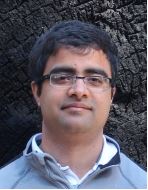By Fakir Balaji
Bengaluru–Bengaluru-born 28-year-old Google research scientist Ananda Theertha Suresh in New York has won the Paul Baran Young Scholar award for 2017, Marconi Society said on Tuesday.
“Suresh has been selected for this year’s Young Scholar award for creating technology that makes search faster and easier even on low-end mobile devices, with basic Internet,” the Society said in an e-mail to IANS.
The Google geek, who has a PhD from the University of California-San Diego, will receive the award from the Society at a special ceremony in New Jersey on October 3.
“Suresh’s work is used by millions of people within speech and keyboard input applications in Google products. His research focused on understanding the most efficient ways to use information, data and communication,” the Society said.
Demystifying his technology, Suresh explained that when an Indian user of a basic feature phone does an internet search through a slow connection, his query is sent to a distant server and he waits for the feedback.

“The glitch for the delay is the uplink which connects to the network. A logjam means a long wait and a mounting data bill for the user. If the information is stripped of all non-essentials and compressed, it will travel faster,” Suresh explained in an e-mail to IANS.
The four-decade-old Society, named after Noble Laureate Guglielmo Marconi (1874-1937), who invented the radio, is also honouring two other Indian-born scientists — Thomas Kailath with a Lifetime Achievement Award for his stellar contribution to modern communications, and Arun Netravalli with the Marconi Prize for his pioneering work in digital video technology used in mobile phones and television sets.
Kailath, 82, from Pune and a former professor at Stanford, is the Hitachi American Professor in Engineering Emeritus at the reputed university. He was also conferred with the Padma Bhushan, India’s third highest civilian award, in 2009.
Netravalli, 71, a native of Ankola on Karnataka’s west coast, studied at Mumbai’s Elphinstone College and graduated in electrical engineering from IIT-Bombay before migrating to the US in 1967 for his post-graduation and doctorate from Houston’s Rice University.
Set up in 1975 by Marconi’s daughter Gioia Marconi Braga through an endowment, the Society annually awards outstanding individuals whose scope of work and influence emulate the principle of ‘creativity in service to humanity’ that inspired Marconi.
The Young Scholars are selected by an international jury of engineers from leading universities and firms on nomination from their academic advisers.
The award consists of $4,000 (Rs.256,000) and expenses to attend the annual ceremony on October 3 where three Young Scholars are honoured every year.
“More than the prize, Young Scholars are offered mentoring and guidance by the Society’s distinguished roster of engineering greats,” said the Society.
“I am humbled and honoured to be in the company of the Society’s past and present award winners. I will also interact with them, as learning from them will inspire me to tackle the challenging problems in the world over,” Suresh said in his e-mail.
Suresh went to the US in 2010 after graduating in engineering physics from IIT-Madras the same year for a masters and PhD in the same subject the University of California-San Diego by 2016.
Suresh did his schooling at Sri Rajarajeshwari Vidya Mandira and obtained a science degree from National College in south Bengaluru. His late father had a printing press and his mother is a homemaker.
As the first in his family to attend college, the geek’s goal is to understand the fundamental limits of what is possible in data science so that he can develop tools that will make an impact on people with limited resources.
At the world’s largest search engine’s research office in New York, where Suresh works, he helps provide latest communication capabilities to netizens with low bandwidth and low-end devices.
“Access and opportunities in the developing countries are limited by low-bandwidth and low-end devices with limited storage and intelligence. Suresh’s algorithms reduce data sent and data costs immensely,” the Society said.
According to Google Research Manager Michael D. Riley, Suresh’s contribution had led to algorithms that give better compression for a decompression time budget than previously used.













